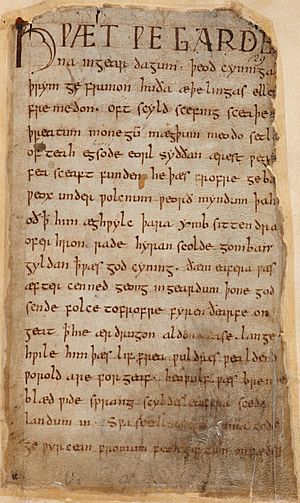Dorothy Whitelock facts for kids
Quick facts for kids
Dorothy Whitelock
|
|
|---|---|
| Born | 11 November 1901 |
| Died | 14 August 1984 (aged 82) |
| Nationality | British |
| Education | Leeds Girls' High School |
| Alma mater | Newnham College, Cambridge |
| Scientific career | |
| Institutions | |

Dorothy Whitelock (born November 11, 1901, died August 14, 1982) was a very important English historian. She studied the early history of England. From 1957 to 1969, she was a professor at the University of Cambridge. She taught about the Anglo-Saxons, an early English people.
Her most famous book was English Historical Documents. It collected many old writings from the years 500 to 1042. She translated these important historical papers. This book helps us understand what life was like in early England. She also wrote other books like The Beginnings of English Society.
Contents
Early Life and School
Growing Up in Leeds
Dorothy Whitelock was born in Leeds, England. This was in 1901. Her father died when she was very young. Even though her family faced money problems, Dorothy was able to go to Leeds Girls' High School.
Studying at Cambridge
Dorothy was a very bright student. In 1921, when she was 20, she went to Newnham College, Cambridge. This is a college at the University of Cambridge. She was one of only four students in her year to study a special part of English history. She did very well in her studies.
Her Amazing Career
Starting Her Research
After college, Dorothy continued her studies. She received special scholarships. These helped her do more research. In 1930, she published her first book. It was a translation of 39 old Anglo-Saxon wills. These wills are like legal documents from a long time ago.
Teaching at Oxford
In 1930, she started teaching. She became a lecturer at St Hilda's College, Oxford. This is another famous university. She taught about the English language from old times. She became a full professor there in 1937. In 1946, she became a university lecturer in Old English.
Breaking Barriers
Dorothy Whitelock was a very talented academic. But she faced challenges because she was a woman. At that time, universities often preferred men for top jobs. In 1945, she tried to become a professor at Oxford. The famous writer J. R. R. Tolkien even voted against her.
This made her feel like giving up. But her friends, Sir Frank and Doris Stenton, encouraged her. They were also important historians. They told her to keep going. Dorothy also worked hard to make things fair for women. She helped women's colleges at Oxford get the same status as men's colleges. This finally happened in 1959.
Return to Cambridge
In the 1950s, Dorothy worked even harder. She wrote many important books. Her biggest achievement was English Historical Documents in 1955. In 1956, she became a member of the British Academy. This is a great honor for scholars.
In 1957, Dorothy returned to Cambridge. She became the Elrington and Bosworth Professor of Anglo-Saxon. This was a very important teaching role. Under her leadership, the department she worked in moved. It became the Department of Anglo-Saxon, Norse and Celtic, University of Cambridge. A photo of her still hangs there today.
Later Years and Legacy
Dorothy Whitelock received an award called a CBE in 1964. This was for her great work. She retired in 1969. But she kept writing and helping other scholars. She led committees and societies.
She lived with her sister in her later years. Dorothy Whitelock passed away on August 14, 1982. She left behind a huge legacy. Her work helped many people understand the history of early England.
Images for kids
-
This is the first page of the famous Beowulf story. It was damaged by fire long ago.
 | William L. Dawson |
 | W. E. B. Du Bois |
 | Harry Belafonte |


